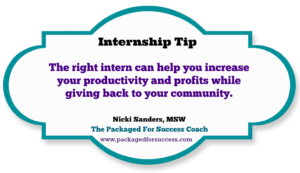How to Build a Successful Internship Program
By Jeff Pruitt
Hiring an intern should not be taken lightly. It comes with responsibility and when done right, can lead to great things for all involved.
Today’s leaders know the costs associated with new-hire recruitment and turnover among millennials is skyrocketing. Could solid internship programs be the key to inspiring longer term commitments within a company?
Internship programs can be an effective means to spot new talent, ready them with relevant on-the-job training and introduce a path to a full-time job after they graduate. But the dream of a successful internship program can crumble into a logistical nightmare if not well planned out. As a business leader, it’s your responsibility to establish a framework that sets your interns and employees up for the most effective experience possible.
Structure a solid program
Ensuring your interns have a meaningful experience begins with your team. Do they realistically have the bandwidth to hire and manage an intern for an extended period of time? If so, identify the worthwhile areas where interns can serve (running for coffee or sitting at a desk with nothing to do won’t cut it).
When deciding on potential responsibilities, consider assigning interns to support one overarching project or initiative, such as research. In other cases, they may be more impactful committing to one type of task for various projects, such as social media for multiple client campaigns.
By pinpointing the top areas of need, single out the skills these individuals should possess in order to successfully contribute. In other words, avoid tasking a student who’s there to learn the ropes in design with copywriting jobs. All this does is create more work for you and a lackluster experience for them.
Approach the interview just as you would any long-term new hire. Make the effort to understand the individual’s strengths, passions and goals, and what they want to gain from their time with you.
Whether full-time or part-time, an intern’s commitment is an investment and exploration into their future career. By taking them on, your company is committing to do whatever possible to help them reach their goals.
Have a gameplan in place
As leaders, we’re always encouraging improved time management and productivity, so nothing is worse than seeing listless interns scrolling through their phones throughout the day or aimlessly wandering from employee to employee looking for busy work. The good news is interns don’t want that either. With an onboarding plan solidly in place, they’ll have understanding of the internship’s scope of work from the get-go and know who to go to for more work and support.
Prior to the intern’s first day, your team should agree on a point person (or persons) to manage their varying duties. To set them up for success, communicate expectations as you would any new hire, and encourage their feedback and questions. Also set aside time to get them up to speed on any programs they might be using during their time there, and show them resources they can turn to if they have questions or get stuck.
A good internship program will master the art of balance between providing interns important guidance, and encouraging autonomy and resourcefulness. That said, the onus is equally on them to create the type of experience they wish to leave with.
Eliminate exclusive behavior
It can be nerve wracking to give interns face time with the clients, but the more you involve them, the richer their experience. Plus, you just never know what fresh ideas they might introduce to the fold.
In that same vein, include them in regular team meetings and keep them up to speed on any projects they might have a hand in. This gives them the chance to listen for opportunities to contribute in the specific areas that interest them.
“Being including in meetings and in various projects is one of the best things companies can do for interns,” said Nysha Chen, student at Taylor University and recent Tallwave intern. “We have weekly team meetings and I’m routinely asked if there are things I’d like to participate in. Knowing where we stand on everything, I’m able to see if there’s something I want to get involved in, and I feel comfortable in speaking up and asking for it.”
Because internships give individuals the chance to explore different aspects of the professional world, maintain a flexible attitude as interns hone their strengths and passions while navigating this role. Doing so may inspire them in new ways they may not have otherwise thought.
“I’m a double major and coming out of this internship, I now know I want to pursue design in my future studies and career,” said Sydney Bettis, student at Texas Christian University and recent Tallwave intern. “Being exposed to so many things, I know going into my sophomore year of college what I like and don’t like.”
Finally, take exit interviews to heart. As your team shares honest feedback, ask for it in return. What could your company have done to be more effective managers and mentors? With constant adjustments to improve the process, your company can build an internship program that opens the doors to today’s top talent, and potentially future new hires.
Article originally appeared on Inc.
